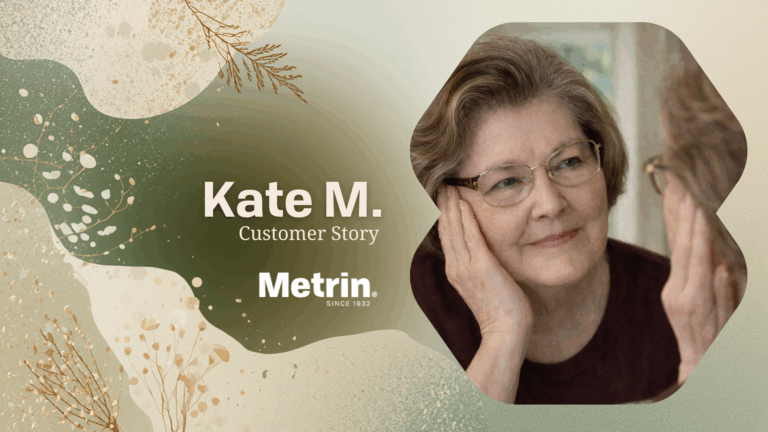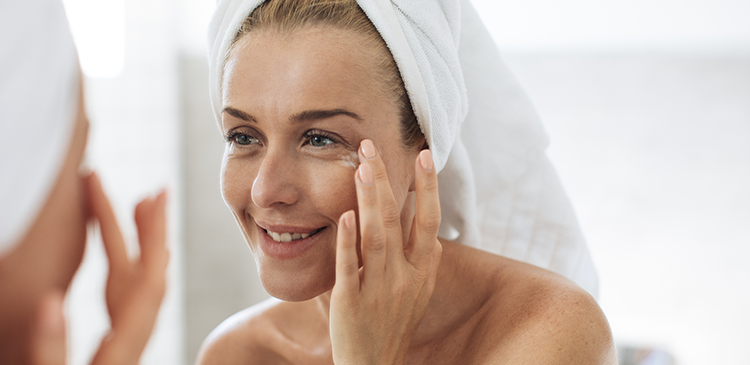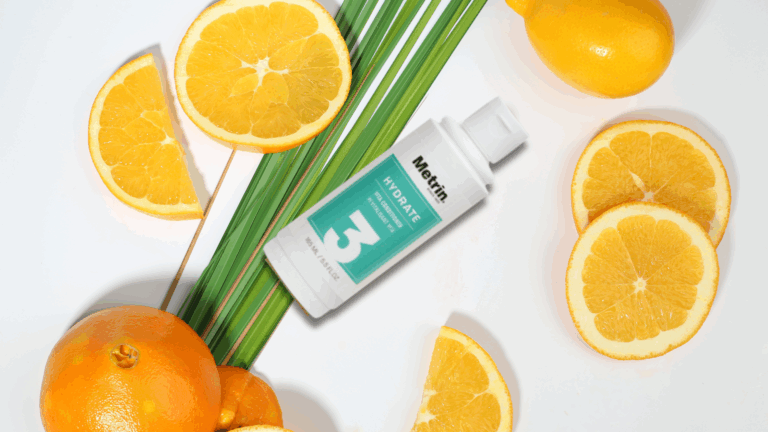Caring for Rosacea with Metrin: What You Should Know
Sometimes changes in our health and or underlying health conditions can throw unwanted skin care challenges. Experiencing rosacea is one of them. We’ve received so many messages over the years from longtime Metrin users navigating their new skin challenges:
“I’ve been using Metrin for over 20 years. I’m in my 40s now and just developed rosacea—light redness around my cheeks and forehead. Should I keep using Metrin?”
“I stopped using Metrin when I started getting rosacea breakouts and had to use prescription creams—but I’d already stopped before the symptoms started. It wasn’t Metrin that caused it.”
“Can Metrin actually help with rosacea?”
We hear you—and we get it.
Rosacea can be frustrating, especially when your skin has changed and you’re trying to figure out what still works. While Metrin isn’t a treatment for rosacea, it can still play a role in keeping your skin calm, balanced, and hydrated. Here’s what to know if you’re living with rosacea and wondering how Metrin fits in.
“I started using Metrin in high school and there is nothing better! I have tried other products but I always came back. Nothing compares in how it cleanses and makes my skin feel – refreshed, clean and nothing is better in treating my rosacea.” Kathlene B.
So, What Is Rosacea?
Rosacea is a chronic inflammatory skin condition that usually shows up after 30. Don’t worry, It’s more common than you might think—around 5% of people globally live with it. It can look different from person to person, but some common signs include:
- Redness on the cheeks, nose, chin, or forehead
- Flushing or visible blood vessels
- Breakouts that resemble acne
- Sensitive, reactive skin
- Dry or rough texture
There’s no one cause, but these factors may play a role:
- Genetics
- A weak skin barrier
- Environmental triggers like sunlight, heat, wind, alcohol, spicy food, or stress
- Demodex mites or certain bacteria
Just a heads up—rosacea is not caused by poor hygiene, and it’s not contagious!
Can You Still Use Metrin?
Short answer: Yes. But be gentle and take it slow.
Metrin was designed to support your skin’s natural functions—not fight against them. It’s fragrance-free, alcohol-free, and doesn’t contain harsh exfoliants, making it a good option for many people with sensitive or rosacea-prone skin.
That said, every skin journey is different. If you’re currently using prescription creams or medications for rosacea, we always recommend easing back into Metrin slowly and spacing out your prescription products and skincare.
How Metrin Can Support Rosacea-Prone Skin
Here’s a closer look at how each step in the Metrin Skincare System can work with your skin:
Steps 1 & 2 – Double Cleanse
Cleanses gently but thoroughly—no stripping, no barrier disruption. This is key for rosacea-prone skin, where the barrier is already a bit compromised.
Step 3 – Vita Conditioner
Acts like a calming pre-moisturizer. It balances pH and hydrates lightly without heavy oils.
Step 4 – Protective Lotion
Hydrating and lightweight, this lotion helps defend your skin from the elements (and keeps redness in check).
Step 5 – Enriched Vita Conditioner
Seals everything in overnight. Moisturizes deeply without clogging pores or overwhelming your skin.
Tips for Using Metrin with Rosacea
If your skin’s flaring up or you’re using prescription treatments, try this approach:
- Patch test first
Try products behind your ear or on your inner arm to make sure your skin reacts well. - Introduce products gradually
Start with one step and add the next every few days. You’ll be able to monitor how your skin responds. - Alternate Metrin and medication
Use your prescription creams at night and Metrin in the morning—or vice versa. Giving your skin breathing room helps minimize irritation. - Skip exfoliants
Avoid scrubs or harsh tools. Rosacea skin does best with soft, consistent care. - Give it time
Skin takes time to adjust. Don’t rush it—especially when dealing with rosacea.
“Before starting Metrin at age 70, I still had acne and rosacea. Metrin is gentle and healing—my skin is clearer, softer, and people say I don’t look my age.” — Eileen T.
Many users have found Metrin complements their skincare even while managing rosacea. If you’re using prescription treatments, check in with your doctor before restarting—but don’t count Metrin out.
Final Thoughts
Rosacea doesn’t mean your skincare routine has to stop—it just needs a few tweaks.
Metrin is built around skin health and long-term support, which is why so many of our users return to it even after a diagnosis. If you’re unsure how to work it back into your routine, we’re here for you. Drop us your questions below!
Give it a go—it’s risk-free. We offer a 6-month money-back guarantee, so you’ve got plenty of time to see how your skin responds.
In the meantime, be kind to your skin. You’re not alone in this, and progress—while sometimes slow—is still progress!








